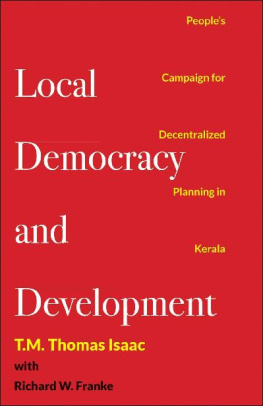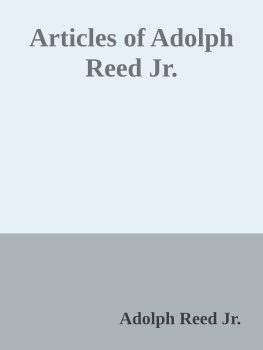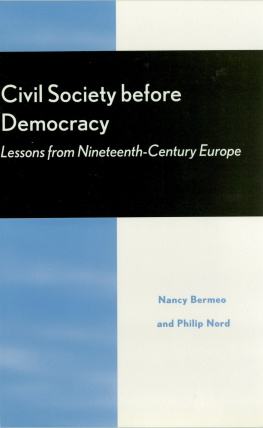
CULTURE, SOCIETY, AND DEMOCRACY
THE YALE CULTURAL SOCIOLOGY SERIES
Jeffrey C. Alexander and Ron Eyerman, Series Editors
PUBLISHED
Triumph and Trauma, by Bernhard Giesen (2004)
Myth, Meaning, and Performance: Toward a New Cultural Sociology of the Arts, edited by Ron Eyerman and Lisa McCormick (2006)
American Society: A Theory of Societal Community, by Talcott Parsons, edited and introduced by Giuseppe Sciortino (2007)
Changing Men, Transforming Culture: Inside the Mens Movement, by Eric Magnuson (2007)
The Easternization of the West, by Colin Campbell (2007)
Culture, Society, and Democracy: The Interpretive Approach, edited by Isaac Reed and Jeffrey C. Alexander (2007)
FORTHCOMING
mile Durkheim Today, by Mustafa Emirbayer
Do We Need Religion? On the Experience of Self-Transcendence, by Hans Joas
Making Los Angeles: How People Create Place Out of Ordinary Urban Space, by Christopher D. Campbell
An Introduction to Contemporary Sociology: Culture and Society in Transition, by Jeffrey C. Alexander and Kenneth Thompson
Jihadi Terrorism in the Modern World, by Farhad Khosrokhavar
Setting the Stage for a New South Africa: A Cultural Approach to the Truth and Reconciliation Commission, by Tanya Goodman
Meaning and Method: The Cultural Approach to Sociology, edited by Isaac Reed and Jeffrey C. Alexander
Culture, Society, and Democracy
The Interpretive Approach
Edited by
Isaac Reed and Jeffrey C. Alexander
with
Nina Eliasoph
J. Nicholas Entrikin
Ronald N. Jacobs
Fuyuki Kurasawa
Paul Lichterman
Eviatar Zerubavel
First published 2007 by Paradigm Publishers
Published 2016 by Routledge
2 Park Square, Milton Park, Abingdon, Oxon OX14 4RN
711 Third Avenue, New York, NY 10017, USA
Routledge is an imprint of the Taylor & Francis Group, an informa business
Copyright 2007, Taylor & Francis.
All rights reserved. No part of this book may be reprinted or reproduced or utilised in any form or by any electronic, mechanical, or other means, now known or hereafter invented, including photocopying and recording, or in any information storage or retrieval system, without permission in writing from the publishers.
Notice:
Product or corporate names may be trademarks or registered trademarks, and are used only for identification and explanation without intent to infringe.
, "The Social Structure of Denial: A Formal Sociological Analysis of Conspiracies of Silence" by Eviatar Zerubavel, appeared in an earlier form in his book The Elephant in the Room: Silence and Denial in Everyday Life (Oxford; New York: Oxford University Press, 2006). By permission of Oxford University Press, Inc.
Library of Congress Cataloging-in-Publication Data
Culture, society, and democracy: The interpretive approach / edited by Isaac Reed and Jeffrey C. Alexander.
p. cm. (Yale cultural sociology series)
Includes bibliographical references and index.
ISBN-13 978-1-59451-341-1 (cloth: alk. paper)
ISBN-10 1-59451-341-4 (cloth: alk. paper)
ISBN-13 978-1-59451-342-8 (pbk.: alk. paper)
ISBN-10 1-59451-342-2 (pbk.: alk. paper)
1. Culture. 2. Democracy. I. Reed, Isaac, (Isaac Ariail) II. Alexander, Jeffrey C., 1947
HM621.C8624 2007
306.201dc22
2007003260
Designed and Typeset by Straight Creek Bookmakers.
ISBN 13: 978-1-59451-341-1 (hbk)
ISBN 13: 978-1-59451-342-8 (pbk)
Contents
| Isaac Reed |
| Paul Lichterman |
| Nina Eliasoph |
| Ronald N. Jacobs |
| Fuyuki Kurasawa |
| J. Nicholas Entrikin |
| Eviatar Zerubavel |
Chapter 1
Cultural Sociology and the Democratic Imperative
Isaac Reed
What is the link between explaining society and criticizing it? This book is about developing a new answer to this question in the context of social theory strongly committed to democracy and the progressive Left. The answer that it proposes, however, is at considerable odds with the answers that frame most leftist social criticism. We propose that both criticism and explanation should be done from the inside outwhich is to say, they should focus on the interpretation of meaning. The link between explaining society and criticizing it is thus a strongly hermeneutic one. Here, I want to sketch out what this means, in the generalized terms of contemporary social theory.
Because skepticism toward the status quo is one of the essential responsibilities of critical intellectuals, the trope of ironythey know not what they dohas always been an element of progressive criticism. Toward whom this irony is pointed has been a constant question (part of the answer, always, is toward ourselves). But the basis for this irony has not always been conceived as tropologicalthat is, as an operation of discourse with certain capacities for understanding social life and for communicating this understanding to others. Instead, it has been conceived as based in objective and certain knowledge of social reality. This has led to a certain brand of overcertainty that, conditioned by causal determinism and historical teleology, articulates calls for social change from on high.
The most obvious way in which this is so is in sociological positivism and its accompanying critical figure, the government adviser. In this conception of criticism, the bulk of the work involved lies in the scientific assessment of social life in terms that, because they are quantitative, are neutral, and because they are neutral, are communicable. It is then the responsibility of the government (i.e., the modern state, entrusted with the power to make and enforce laws and to distribute tax revenue) to accept the rational advice of the experts and implement subtle or not-so-subtle changes in society.
The capacity of this kind of criticism to create change for the good should not be underestimated. Still, sociologists with a broader theoretical agenda are likely to find it wanting. For one of the most active meanings of the term critical intellectual is the sense that intellectuals have the ability to think beyond the current constellation of government programsindeed, to think critically about the relationship of intellectuals to the government, and historically about the shifting relationship of governments to their people. Furthermore, in the last forty years, even liberal intellectuals have become skeptical about the social effects of rational, neutral, and expert knowledge, to the point where one can without blinking put these three terms inside scare quotes.
In the twentieth century, there was another place to go for progressive thinkers who wanted a broader perspective, a more dramatic historical narrative, and an expanded critical capacity: Marxism and its epistemological umbrella, historical materialism. From this perspective, the supposed objectivity of positivism (and its liberal adherents) was a mirage, a piece of bourgeois ideology that naturalized the in fact quite constructed and historically contingent categories of capitalist society into a second nature (Lukacs 1972). Instead, Marxism proposed to get underneath the surface equations of bourgeois economics and the quasi-guarantees of liberal rights discourse to discover the essential mechanisms of social oppression and historical changeand thus also of social liberation. Then the critic could align her pen with the actions of the revolutionary classes, and both could align their agency with objective historical trends.










